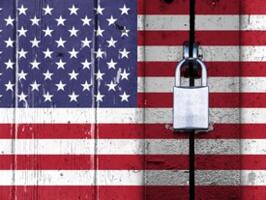Most See National Security Danger in Government’s Focus on Coronavirus
Voters strongly believe the coronavirus is a major threat to America’s national security, and most think our enemies are likely to exploit the U.S. government’s focus on the disease.
The latest Rasmussen Reports national telephone and online survey shows that 90% of Likely U.S. Voters consider the coronavirus a serious national security threat to the United States, with 57% who say it’s a Very Serious one. Just eight percent (8%) say it’s a not very or Not At All Serious threat. (To see survey question wording, click here.)
Sixty-six percent (66%) think it’s likely that U.S. enemies will try to take advantage of our government’s focus on the coronavirus, although that includes just 29% who say it’s Very Likely. Twenty-eight percent (28%) believe America’s enemies will not try to exploit the U.S. government’s focus on the virus, but only six percent (6%) feel it’s Not At All Likely.
Among voters who see the coronavirus as a Very Serious threat to U.S. national security, 72% worry that our enemies are likely to try to take advantage of the U.S. government’s focus on the coronavirus, with 37% who believe it’s Very Likely.
(Want a free daily e-mail update? If it's in the news, it's in our polls). Rasmussen Reports updates are also available on Twitter or Facebook.
The survey of 1,000 Likely Voters was conducted March 23-24, 2020 by Rasmussen Reports. The margin of sampling error is +/- 3 percentage points with a 95% level of confidence. Field work for all Rasmussen Reports surveys is conducted by Pulse Opinion Research, LLC. See methodology.
Voters divide along party lines when asked if it’s racist for President Trump to describe the coronavirus which originated in Wuhan. China as a “Chinese virus.” Most Democrats say yes; most Republicans say no, and unaffiliated voters are closely divided.
The majority of voters in most demographic categories regard the coronavirus as a Very Serious threat to U.S. national security.
Republicans (73%) believe more strongly than Democrats (61%) and voters not affiliated with either major party (65%) that our enemies are likely to try to take advantage of the U.S. government’s focus on the virus.
Men feel more strongly than women do that U.S. enemies are likely to take advantage of the government’s current focus. Seniors are more likely to believe that than younger voters, although concern is high among all age groups.
Seventy-six percent (76%) of voters who Strongly Approve of the job Trump is doing feel that our enemies are likely to make a move while the U.S. government is focused on the virus. That view is shared by 60% of those who Strongly Disapprove of the president’s job performance.
Ninety-four percent (94%) of all voters agreed with Trump in late 2017 when he said a strong economy is important to U.S. national security.With the stock market in free fall as the coronavirus spreads here, this helps explain the president’s focus on government aid to boost the economy.
Given China’s initial silence about the outbreak of the coronavirus which allowed it to spread worldwide, a sizable number of voters here think the Asian giant needs to pay for some of the losses the virus has caused. Twenty-one percent (21%) consider China a U.S. enemy. Only 10% say it’s an ally, while 61% rate it somewhere in between.
North Korea and Iran have long led the list of countries most Americans regard as enemies.
Additional information from this survey and a full demographic breakdown are available to Platinum Members only.
Please sign up for the Rasmussen Reports daily e-mail update (it's free) or follow us on Facebook. Let us keep you up to date with the latest public opinion news.
The survey of 1,000 Likely Voters was conducted March 23-24, 2020 by Rasmussen Reports. The margin of sampling error is +/- 3 percentage points with a 95% level of confidence. Field work for all Rasmussen Reports surveys is conducted by Pulse Opinion Research, LLC. See methodology.
Rasmussen Reports is a media company specializing in the collection, publication and distribution of public opinion information.
We conduct public opinion polls on a variety of topics to inform our audience on events in the news and other topics of interest. To ensure editorial control and independence, we pay for the polls ourselves and generate revenue through the sale of subscriptions, sponsorships, and advertising. Nightly polling on politics, business and lifestyle topics provides the content to update the Rasmussen Reports web site many times each day. If it's in the news, it's in our polls. Additionally, the data drives a daily update newsletter and various media outlets across the country.
Some information, including the Rasmussen Reports daily Presidential Tracking Poll and commentaries are available for free to the general public. Subscriptions are available for $4.95 a month or 34.95 a year that provide subscribers with exclusive access to more than 20 stories per week on upcoming elections, consumer confidence, and issues that affect us all. For those who are really into the numbers, Platinum Members can review demographic crosstabs and a full history of our data.
To learn more about our methodology, click here.





